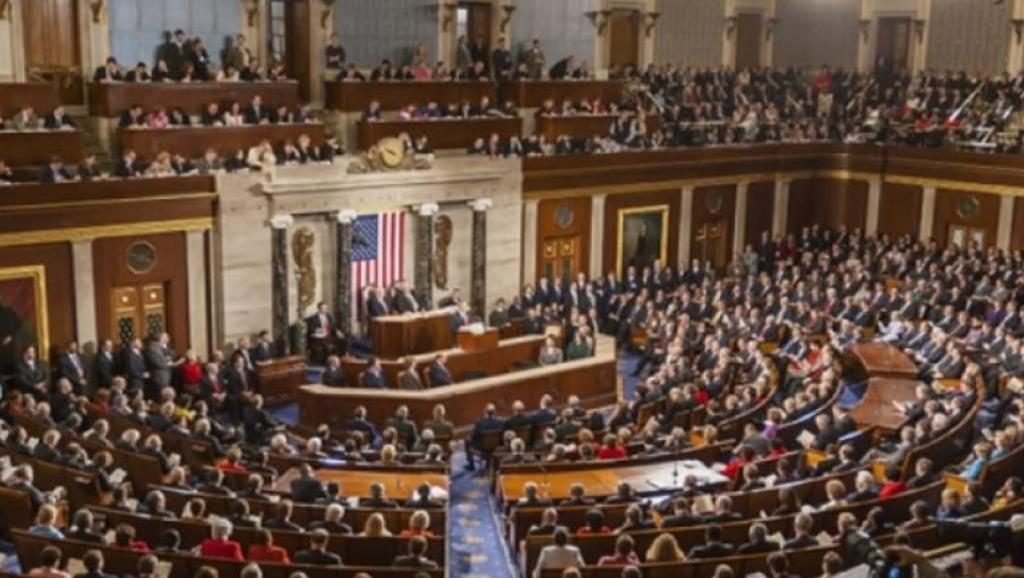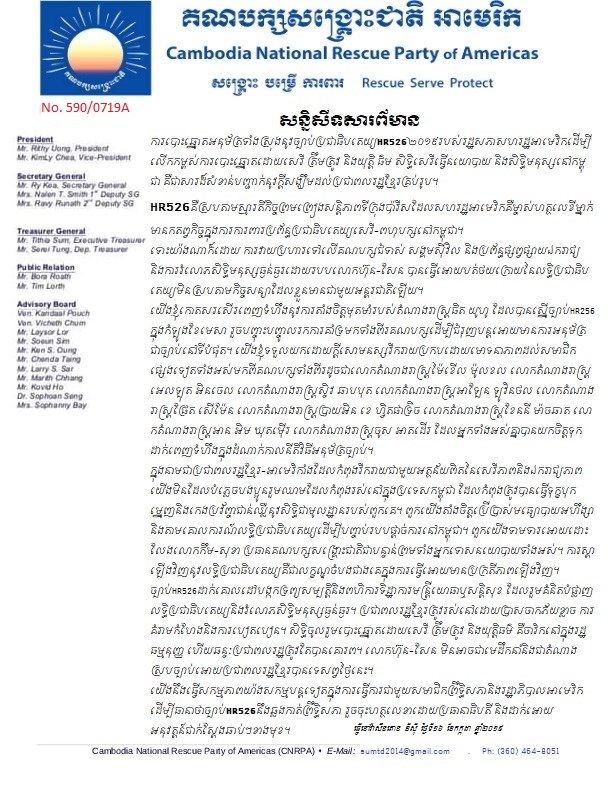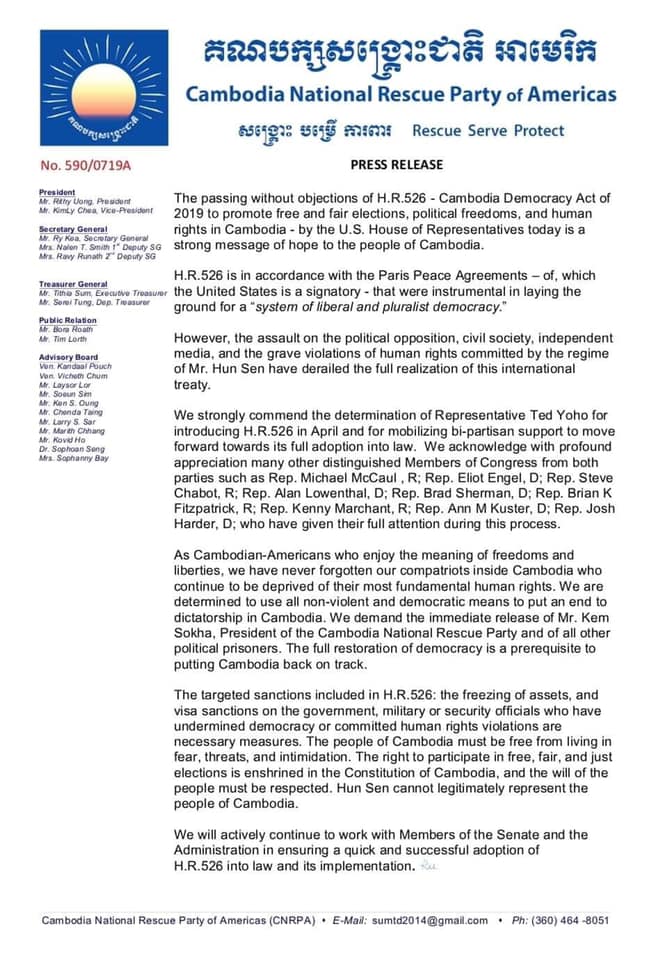Shown Here:
Referred in Senate (07/16/2019)
| 116th CONGRESS 1st Session |
H. R. 526
IN THE SENATE OF THE UNITED STATESJuly 16, 2019
Received; read twice and referred to the Committee on Foreign Relations

AN ACT
To promote free and fair elections, political freedoms, and human rights in Cambodia, and for other purposes.
Be it enacted by the Senate and House of Representatives of the United States of America in Congress assembled,


SECTION 1. SHORT TITLE.
This Act may be cited as the “Cambodia Democracy Act of 2019”.
SEC. 2. FINDINGS.
Congress finds the following:
(1) Prime Minister Hun Sen has been in power in Cambodia since 1985 and is the longest-serving leader in Southeast Asia. Despite decades of international attention and assistance to promote a pluralistic, multi-party democratic system in Cambodia, the Government of Cambodia continues to be undemocratically dominated by the ruling Cambodia People’s Party (CPP), which controls every agency and security apparatus of the state.
(2) In 2015, the CPP-controlled parliament passed the “Law on Associations and Non-Governmental Organizations”, which gave the government sweeping powers to revoke the registration of NGOs that the government believed to be operating with a political bias in a blatant attempt to restrict the legitimate work of civil society. On August 23, 2017, Cambodia’s Ministry of Foreign Affairs ordered the closure of the National Democratic Institute and the expulsion of its foreign staff. On September 15, 2017, Prime Minister Hun Sen called for the withdrawal of all volunteers from the United States Peace Corps, which has operated in Cambodia since 2006 with 500 United States volunteers providing English language and healthcare training.
(3) The Government of Cambodia has taken several measures to restrict its media environment, especially through politicized tax investigations against independent media outlets that resulted in the closure of The Cambodian Daily and Radio Free Asia in early September 2017. Additionally, the Government of Cambodia has ordered several radio stations to stop the broadcasting of Radio Free Asia and Voice of America programming.
(4) On September 3, 2017, Kem Sokha, the President of the Cambodia National Rescue Party (CNRP), was arrested on politically motivated charges, including treason and conspiring to overthrow the Government of Cambodia, and faces up to 30 years in prison. The CNRP’s previous leader, Sam Rainsy, remains in exile. On November 16, 2017, Cambodia’s Supreme Court dissolved the CNRP, eliminating the primary opposition party.
(5) Each of the six elections that have taken place in Cambodia since 1991 were conducted in circumstances that were not free and fair, and were marked by fraud, intimidation, violence, and the government’s misuse of legal mechanisms to weaken opposition candidates and parties.
(6) In the most recent general election in July 2018, following the dissolution of the CNRP, the CPP secured every parliamentary seat, an electoral victory that a statement from the White House Press Secretary stated was “neither free nor fair and failed to represent the will of the Cambodian people”.
(7) The United States is committed to promoting democracy, human rights, and the rule of law in Cambodia. The United States continues to urge the Government of Cambodia to immediately release Mr. Kem Sokha, reinstate the political status of the CNRP and restore its elected seats in the National Assembly, and support electoral reform efforts in Cambodia with free and fair elections monitored by international observers.
SEC. 3. SANCTIONS RELATING TO UNDERMINING DEMOCRACY IN CAMBODIA.
(a) Designation Of Persons Responsible For Undermining Democracy In Cambodia.—
(1) IN GENERAL.—Not later than 180 days after the date of the enactment of this Act, the President shall designate and transmit to the appropriate congressional committees a list of—
(A) each senior official of the government, military, or security forces of Cambodia who the President determines has directly and substantially undermined democracy in Cambodia;
(B) each senior official of the government, military, or security forces of Cambodia who the President determines has committed or directed serious human rights violations associated with undermining democracy in Cambodia; and
(C) entities owned or controlled by senior officials of the government, military, or security forces of Cambodia described in subparagraphs (A) and (B).
(2) IMPOSITION OF SANCTIONS.—The President shall impose the sanctions described in subsection (b) on each foreign person designated pursuant to paragraph (1).
(3) UPDATES.—The President shall transmit to the appropriate congressional committees updated lists under paragraph (1) as new information becomes available.
Continue reading